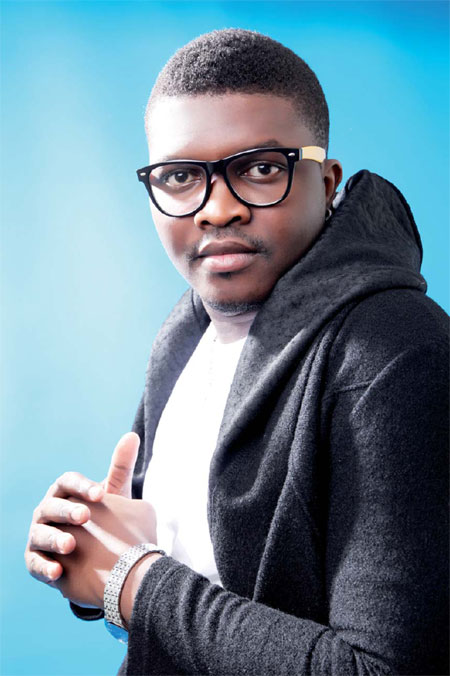Singing the song of success
|
Uwechue says the more he learns about Chinese culture, the more comfortable he will feel there. Provided to China Daily |
A young Nigerian has made a name for himself in China by performing the nation's patriotic red songs
The Internet has made the term "overnight success" redundant. Now fame can come in minutes, not hours. Just ask Stephen Uwechue.
The 29-year-old Nigerian singer's dream of a successful career in China took off in 2011 when his first attempt at singing a red song in praise of Chairman Mao quickly attracted a million hits on the Internet.
Suddenly, the Nigerian was famous for singing classic Chinese revolutionary songs in what to him was still a strange language.
"He can sing about 50 Chinese red songs now, and that's more than most Chinese can sing," Yu Xin, Uwechue's manager, says.
Uwechue is now the lead singer of Wuzhou Zuhe, one of China's most popular bands. The Beijing-based pop group consists of five people from five continents, but Uwechue still sings his beloved red songs.
Chinese red songs are about the Communist revolution that led to the formation of New China in 1949. The songs praise Chairman Mao Zedong, the Communist Party of China and the soldiers and citizens of the revolution. They are classics of modern China that vividly depict the tragedies and triumphs of those revolutionary times.
Uwechue became aware of red songs by accident. In 2011, when the nation was celebrating the 90th anniversary of the formation of the CPC, millions of people all over China were singing those patriotic songs.
Yu saw a good opportunity for Uwechue and encouraged him to learn some of the songs. The young Nigerian soon fell in love with the songs as they helped him learn more about Chinese culture and history.
"Many red songs tell stories about the revolution and mention many place names, so I learned a lot by singing them," Uwechue says.
The singer says he was surprised to hear that younger Chinese are not interested in these songs, as he considers them memorable as well as interesting.
"In Africa we don't have such music and it took me a lot of time to learn how to sing them," he says.
Before he learned about the background to these songs, Uwechue once made a cultural faux pas by adding a few Michael Jackson-style dance steps to a performance at a singing competition.
"One of the judges gave a very stern criticism of my performance, and told me to do some study on the background of the song," Uwechue says.
To better understand red songs, Uwechue would try to watch a video of any song he was learning. Whenever he came across something he did not understand, he asked one of his Chinese friends to explain it to him.
"A lot of the songs are about the hardship people endured during those times, and once I realized that, I tried to put that feeling into my singing. There was nothing funny in those performances," he says.
In 2001, Uwechue entered a red song competition in Jiangxi province. He came sixth out of about 200 competitors, five of whom were foreigners.

Uwechue came to China in 2008, following his older brother. Emmanuel Uwechue was already well known in China as he had sung on many Chinese TV shows, including the Spring Festival gala. His brother's success convinced Uwechue to try his luck in China.
However, singing in China is not easy as the style is so different from what Uwechue grew up with in Africa.
"Compared with how I used to sing in Africa, the Chinese way of singing tends to be more restrained," he says.
At first, he tried to sing Chinese songs in an African style, but this never quite worked. He says it took him six years to learn to adapt his natural style to suit Chinese songs, but now he says he prefers local songs and rarely sings in English.
"I couldn't learn the pure Chinese way of singing, but instead I hope my African style can add a new element and flavor to Chinese songs," he says.
Uwechue now has about 20,000 followers on Sino Weibo, China's biggest micro-blog site, and came fourth on Star Boulevard, one of China's most popular grassroots talent shows.
Fascinated by Chinese culture, Uwechue has also learned some songs from classical Chinese opera.
He joked that after learning to sing traditional Chinese opera, performing red songs no longer seems that difficult.
Uwechue's father was a pastor and he grew up surrounded by church music. He fell in love with music at a young age.
"I saw and heard pianos, drums and other instruments in church almost every day as I was growing up," he says.
By the age of 10, Uwechue had joined the church choir and was performing on stage. Later he sang at weddings and in bars, and in 2008 he followed his brother to China to pursue his dream of a singing career.
"I like China," Uwechue says, "Chinese people are kind and warm-hearted. Without their support and hospitality, I could not have stayed and developed as far as I have."
He says he is grateful for the way Chinese audiences have accepted him, a young African singing Chinese songs to the Chinese.
Uwechue says he still has a lot to learn, as his home country and his adopted one are so different. But he knows the more he learns about Chinese culture, the more comfortable he will feel there.
liaoxue@chinadaily.com.cn

























